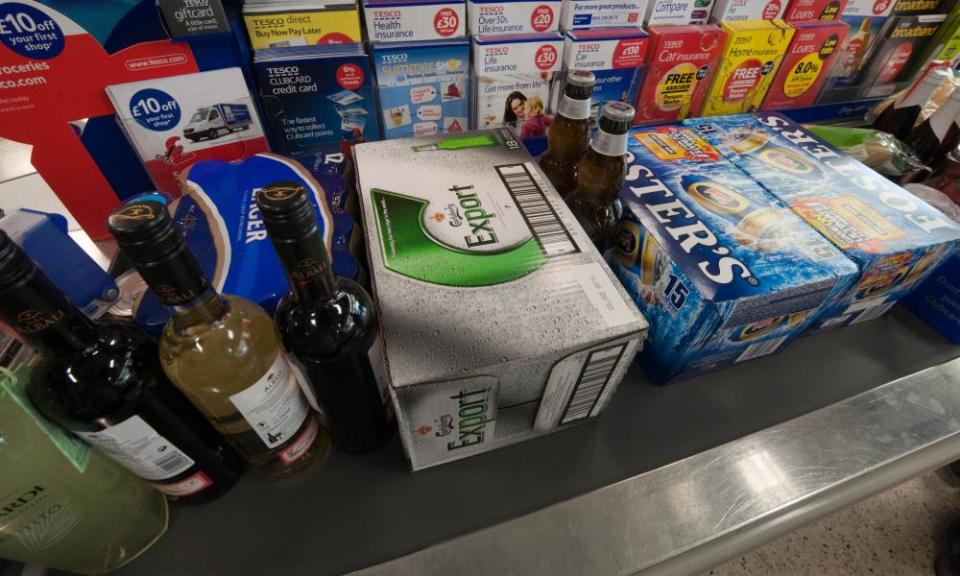Tesco's plastics purge: what took so long and is it enough?

Tesco is to remove 67m pieces of plastic from its shelves from March by doing away with the plastic wraps commonplace on multibuy packs of tins. It sounds like a huge amount, but is still only a small proportion of the 1bn pieces of plastic that the chain has pledged to remove this year.
Campaigners hailed the move as “simple logic” and “common sense”, asking why retailers had not done this sooner. Part of the answer is that they were not sure consumers would continue to respond to multibuy offers if the tins were not physically bound together, but trials appear to have produced positive results.
Related: Tesco to stop sale of plastic-wrapped multipacks in stores
Tesco’s move will apply only to tinned goods, leaving many other products still sheathed together in plastic multipacks, from vegetables and chocolate bars to drinks and bottles of shower gel.
The company has said the move will not result in greater need for other types of packaging such as cardboard, and nor is there any need to substitute other materials in the packaging. That is positive: recent work by the Green Alliance has highlighted the dangers of simple substitution.
Libby Peake, the head of resource policy at Green Alliance, said: “This contrasts with some of the other moves we’ve seen in the grocery sector where companies are sometimes replacing unnecessary single-use plastic items with equally unnecessary single-use items made from other materials.”
For instance, single-use thin plastic fruit bags are sometimes replaced with paper, which can have higher carbon impacts, and single-use plastic ready meal trays are being replaced with coated fibreboard, which is difficult to recycle. Single-use cutlery is being made from wood or compostable plastic, which the UK’s recycling infrastructure cannot handle.
“This trend of substituting plastic for other materials, while maintaining the current disjointed packaging system, risks trading our current problems with plastic pollution for other environmental problems down the line,” said Peake. “An approach that tackles all unnecessary material use is a big part of what’s needed.”
Other retailers and consumer goods companies are also at work on cutting down their use of plastic. Greenpeace highlights Waitrose, Morrisons, Asda and Marks & Spencer, which are trying out food dispensers and liquid refill stations. This is the best long-term solution, because any single-use packaging item – including paper or cardboard – uses resources and cannot always be recycled.
Peake also wants to see more regulation from the government, as voluntary measures by companies will not produce the changes needed quickly enough. “A big part of the problem is that in the absence of government leadership, businesses are often adopting conflicting approaches,” she said. “In private discussions they admit they’re still competing on packaging innovations in unhelpful ways to gain market share. Government needs to intervene if that’s going to stop.”
Many retailers have targets on the “recyclability” of their plastic products, but recycling alone will not work, said Sander Defruyt, the lead on the new plastics economy at the Ellen MacArthur Foundation. “Globally, recycling rates are still very low: more than 40 years after the recycling symbol was introduced, less than 10% of plastic packaging is recycled. We cannot recycle our way out of the problems of plastic waste and pollution. More companies need to take action to eliminate the plastic we don’t need.”
More than 25 companies have banded together to invest $1bn over five years in projects to reduce plastic use. But that is a drop in the plastic-filled ocean relative to the profits that plastics help companies make annually.
Green groups want all companies to go further. “It’s great that Tesco are getting rid of multipack plastic packaging that’s completely pointless, and are also pressuring their branded suppliers like Heinz and Branston to do the same,” said Fran Nicholls, an oceans plastics campaigner for Greenpeace UK. “This is such an easy, common-sense first step that all supermarkets should have done this long ago. We urge retailers to end the nonsense of double-plastic packaging on all products straight away and be bolder by introducing reusable and refillable packaging.”

